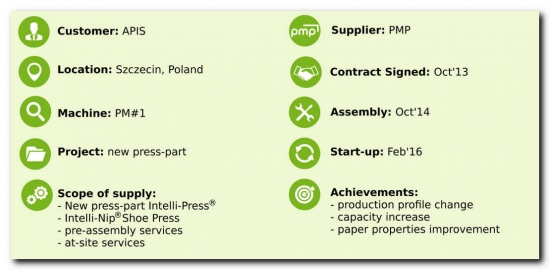Ianadmin
UPM Shotton’s Solar Success
UPM Shotton, a leading producer of 100% recycled newsprint, took a huge leap in its use of renewable energy earlier this year, following a connection to the UK’s largest solar park on the Deeside Industrial Estate in North Wales. The link-up means that UPM Shotton can run almost every daylight hour on 100% renewable energy. The solar site, which is visible from outer space, is one of the last and largest of its type under the current UK government policy.
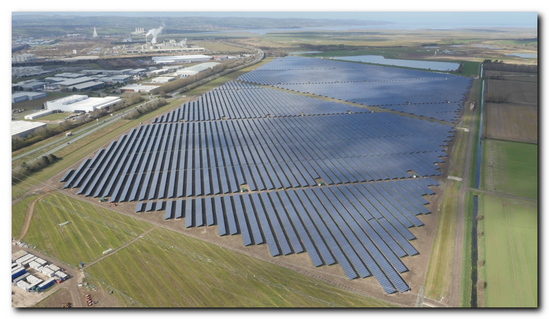
The paper mill, which employs approximately 200 people across its Deeside site, already sources 70% of its energy needs via its renewable sources which includes its own biomass power plant which commenced operation in 2006. The agreement with British Solar Renewables Welink Energy and Compton Group means that UPM Shotton has halved its purchase of power in April.
Andrew Bronnert, Head of Pulp and Energy for UPM Shotton, comments: “We already have a renowned energy policy with integrated assets such our own power plant and connectivity to EirGrid which operates wind farms in the Irish Sea and leases part of the UPM Shotton site.
“Our parent company UPM is already a world-leader in renewable energy and its strategy is to continually increase its use of energy from renewable sources such as hydro-power in Finland and its latest innovation bio-diesel derived from wood fibres.
“This latest collaboration with British Solar Renewables,Welink Energy and Compton Group means we now have one of the most sophisticated energy provisions in manufacturing and adds to our strong environmental credentials which are recognised by the Welsh Government and its sustainability teams.”
Andrew Dodge from the joint venture between British Solar Renewables,Welink Energy and Compton Group added: “We’re delighted in the partnership and support we have received from UPM Shotton. With this particular project we’ve been able to further demonstrate our combined strength in business and renewables, working together to create an effective supply of energy for large manufacturing sites.”
The award-winning mill will also start up a second power plant and turbine in December 2016, enabling 100 per cent use of all steam produced on site.
The Solar Park has over 250,000individual photovoltaic panels and during daylight hours can provide the UPM Shotton site with 100% of its output. The paper mill is also connected to the National Grid and is able to sell-back some of its unused energy for example, during maintenance time when the paper machine is not running.
UPM Shotton is part of UPM Paper ENA which is a member of the UPM-Kymmene Corporation. The paper mill produces 100% recycled newsprint from recovered newspapers and magazine from the UK domestic recycling supply chain. The mill started operations in 1985 and has a single paper production line, a renewable power plant and a £17m materials recovery facility. It employs approximately 200 persons.
UPM Paper - UPM is the world's leading producer of graphic papers and a supplier of a wide product range that includes magazine, newsprint, fine and speciality papers. UPM believes in the future of print and its effective coexistence with digital media.
UPM’s paper business consists of two distinct business areas located at the centre of their market: UPM Paper ENA (Europe & North America) and UPM Paper Asia. Together these two businesses employ around 11 000 papermakers - www.upmpaper.com
British Solar Renewables deliver large scale solar farms and on-site solar generation. We offer tailored services that include design, development, grid connection, operation and maintenance, which enables us to continually innovate, improve efficiency and drive down cost.
The company has a strong track record in delivering solar projects and since our launch in 2010 we have connected over 340MW of solar pv power plants. All of our sites are constructed to the highest standards using UK sourced parts and labour where ever possible. This helps ensure all of our projects have low environmental impact and supports the UK economy whilst making a significant contribution to future energy demands. British Solar Renewables
Toscotec starts up PM1 press section rebuild at Papeterie Sical, France.
Papeterie Sical and Toscotec announce the successful start-up of PM#1 after a deep press section and related parts modification. The machine came in operation according the planned shut-down time and, after the optimization phase, is now producing the targeted container board products quality.
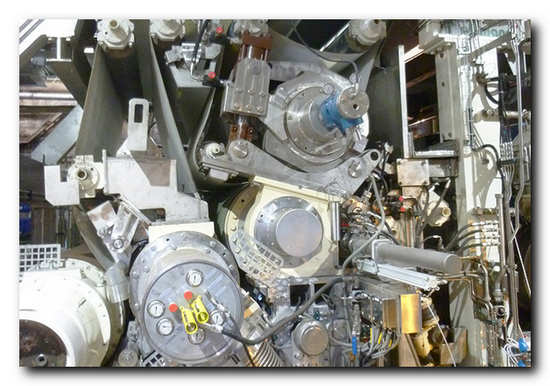
The project, finalized to improve out press dryness performance, liners top side printability as well as machine runnability, includes new TT Combi-Press with a tailored TT Pick-up press roll, new press rolls with related cleaning doctors, a major press frame rebuilt integrated in the wire section structure, and a complete tail threading from press to dryer section including the area of the existing shoe press in last position. A broke pulper modification and initial part of dryer section implementation with new TT steel Dryer is part of the rebuild, that includes erection, erection supervision, start-up assistance and training.
With a web width of 2.570 mm and a design speed of 500 m/min, the renewed PM#1 produces container board grades as Brown Test Liners, Brown Liners and Medium in the range 100 to 220 g/m2, with a yearly capacity of 45.000 tons/year.
Thanks to the strong cooperation between the two project teams, the success of this rebuild confirms the Toscotec ability to supply technological and complex reconstruction in the board sector.
About Papeterie Sical
Papeterie Sical, located in the Nord-Pas-de-Calais region of France, is part of Rossmann Group, the main independent packaging manufacturer in Europe and Africa with a box plants production capacity of 500.000 Tons/year. With 10 sheets plants in Western Europe and 1 in Burkina Faso, with a yearly capacity of 300.000 Tons/year of papers made from recycled fibers, Grossman Group is a leader in Europe offering various kind of printed packaging.
About Toscotec S.p.A.
Since 1948, Toscotec offers complete production lines, plant retrofits, and individual machineries for tissue and paper & board industries. Headquartered in Lucca, the nerve centre of the Italian paper district, with offices in China and North America, the Group serves all the leading paper producers with customized solutions, leveraging on the experience gained in more than 60 years of activities.
Increased Demand for Paper and Paper Products Will Drive the Paper Manufacturing Market in Bulgaria until 2020
Technavio analysts forecast the paper manufacturing market in Bulgaria to grow at a CAGR of more than 12% during the forecast period, according to their latest report.
 The research study covers the present scenario and growth prospects of the paper manufacturing market in Bulgaria for 2016-2020. To calculate the market size, the report considers the value of paper manufactured in the country. The report also presents the manufacturer landscape and a corresponding database of the key manufacturers involved in the production of paper.
The research study covers the present scenario and growth prospects of the paper manufacturing market in Bulgaria for 2016-2020. To calculate the market size, the report considers the value of paper manufactured in the country. The report also presents the manufacturer landscape and a corresponding database of the key manufacturers involved in the production of paper.
Technavio chemicals and materials analysts highlight the following three factors that are contributing to the growth of the paper manufacturing market in Bulgaria:
Investment destination for paper manufacturing industry
Increased demand for paper and paper products
Intense competition among manufacturers of tissue paper and hygiene products
Investment destination for paper manufacturing industry
Bulgaria is a major exporter of paper and paper products in Eastern Europe. In terms of revenue, the paper industry registered a strong growth of 23.9% in 2010, which increased to 68.4% in 2013. The paper manufacturing industry in Bulgaria is dominated by foreign players because of favorable government policies, availability of cheap labor, and its strategic location near markets in the EU.
“Bulgaria’s accession to the EU in 2007 provided it with a significant cost advantage because of the fixed exchange rate of the Bulgarian Lev. This made Bulgaria a very attractive destination for investors in the paper manufacturing market,” says Chandrakumar Badala Jaganathan, a lead analyst at Technavio for textile, fiber, and composites research.
Increased demand for paper and paper products
The demand for paper and paper products has increased significantly over the past few years. Paperboard is a key product that can be folded, is lightweight and strong, and resistant to lasers used in high-speed automated filling. High-quality printing on paperboard packaging can enhance the aesthetic appeal of packaged goods and their sales, and this has led to retailers opting for this type of packaging. The popularity of paperboard packaging is also on the rise due to 30% of companies focusing on redesigning their existing packaging to make it more attractive. Paper and paperboards are also versatile in terms of the variety of products that can be packaged using these materials. “The demand for paperboard containers has led to demand for corrugated paper, which is used to wrap these containers to enhance the safety of packaged products. Such an increased demand for paper and paper products have enhanced the potential for growth,” adds Chandrakumar.
Intense competition among manufacturers of tissue paper and hygiene products
In 2015, nearly 50%-60% of the demand for tissue paper in Bulgaria was catered to by the top four players in the industry. These included Belopaper, Ficosota Syntez, Interpred Partner, and Procter & Gamble (P&G). However, competition among the top players has intensified, especially in sub-categories such as toilet paper, sanitary pads, and baby wipes because of aggressive advertising and distribution strategies. This has also led to the diversification of products by the players, resulting in the availability of a wide variety of choices, which has contributed to the growth of the market.
About Technavio
Technavio is a leading global technology research and advisory company. The company develops over 2000 pieces of research every year, covering more than 500 technologies across 80 countries. Technavio has about 300 analysts globally who specialize in customized consulting and business research assignments across the latest leading edge technologies.
Technavio analysts employ primary as well as secondary research techniques to ascertain the size and vendor landscape in a range of markets. Analysts obtain information using a combination of bottom-up and top-down approaches, besides using in-house market modeling tools and proprietary databases. They corroborate this data with the data obtained from various market participants and stakeholders across the value chain, including vendors, service providers, distributors, re-sellers, and end-users.
Technavio Announces Top Three Emerging Trends Impacting the Paper Manufacturing Market in Serbia until 2020
Technavio’s latest report on the paper manufacturing market in Serbia provides an analysis on the most important trends expected to impact the market outlook from 2016-2020. Technavio defines an emerging trend as a factor that has the potential to significantly impact the market and contribute to its growth or decline.
Paper manufacturing market in Serbia at a glance
 The paper manufacturing market in Serbia has been growing at a modest rate since 2010. Strong demand from the domestic market for consumer products, such as paper-based household and sanitary products, has contributed to the growth of manufacturers. Consumer spending on these products has remained stable despite the negative impact of the global economic recession of 2008, and the country’s negative GDP growth between January 2014 and July 2015. Demand from non-household end-users, such as the catering industry and retailers of consumer products, is also expected to increase during the forecast period.
The paper manufacturing market in Serbia has been growing at a modest rate since 2010. Strong demand from the domestic market for consumer products, such as paper-based household and sanitary products, has contributed to the growth of manufacturers. Consumer spending on these products has remained stable despite the negative impact of the global economic recession of 2008, and the country’s negative GDP growth between January 2014 and July 2015. Demand from non-household end-users, such as the catering industry and retailers of consumer products, is also expected to increase during the forecast period.
The top three emerging trends driving the paper manufacturing market in Serbia according to Technavio chemicals and materials research analysts are:
Growing focus on niche product segments
Increase in demand and production of recycled paper
Rise in consolidation
Growing focus on niche product segments
Large and medium-sized manufacturers are focusing on niche consumer product segments to enhance revenues. The demand for impregnated wet wipes and tablecloths, in particular, grew at a CAGR of over 10% during 2013-2015. Though these products account for a small share of the overall paper manufacturing market in Serbia, increasing demand for such products is expected to have a significant impact on the market during the forecast period. “These product segments are relatively under-penetrated compared to other consumer product segments, such as paper-based tissues and sanitary products, and, hence, are likely to provide manufacturers with growth opportunities,” says Chandrakumar Badala Jaganathan, one of the lead analysts at Technavio for research on textile, fiber, and composites.
Increase in demand and production of recycled paper
Recycled paper is derived from fibers recovered from scrap paper. The consumption of recycled paper in Serbia increased tremendously during 2009-2015. In 2009, the consumption of recycled paper in Serbia amounted to approximately 12,000 tons, and this increased further at a CAGR of over 77% during 2009-2015. Production and imports of recycled paper also grew at CAGRs of over 25% and over 10%, respectively, during the same period. The demand for products belonging to this segment is expected to contribute to the growth of manufacturers offering these products, apart from attracting new entrants.
Rise in consolidation
The paper manufacturing market in Serbia is witnessing increasing consolidation, especially in segments such as paper packaging. For instance, in 2014, Mondi, an international packaging and paper group, acquired Intercell, a Serbian manufacturer of industrial paper bags. Currently, Mondi holds a market share of 30%-40% of the paper manufacturing market in Serbia. “The entry of foreign manufacturers is likely to increase during the forecast period because of the market’s growth potential, which in turn is expected to lead to a rise in consolidation,” adds Chandrakumar.
Competitive scenario
The paper manufacturing market in Serbia is characterized by the presence of over 600 manufacturers, of which, 82.1% are micro-sized and 14.8% are small-sized manufacturers. Competition is largely between the medium and large-sized manufacturers.
The paper manufacturing market in Serbia is characterized by the presence of diverse international and regional manufacturers. However, as international players have established their footprint in the market, regional manufacturers are finding it increasingly difficult to compete with them, especially on aspects such as quality, technology, and pricing. International players are expected to grow inorganically by acquiring regional and local players. In addition, there is an influx of private labels in the market.
About Technavio
Technavio is a leading global technology research and advisory company. The company develops over 2000 pieces of research every year, covering more than 500 technologies across 80 countries. Technavio has about 300 analysts globally who specialize in customized consulting and business research assignments across the latest leading edge technologies.
Technavio analysts employ primary as well as secondary research techniques to ascertain the size and vendor landscape in a range of markets. Analysts obtain information using a combination of bottom-up and top-down approaches, besides using in-house market modeling tools and proprietary databases. They corroborate this data with the data obtained from various market participants and stakeholders across the value chain, including vendors, service providers, distributors, re-sellers, and end-users.
PMP SUCCESSFULLY IMPLEMENTS ANOTHER INTELLI-NIP® SHOE PRESS
NEW PRESS SECTION INTELLI-PRESS® FOR PM#1 APIS SZCZECIN- SKOLWIN, POLAND
Read more:
In February 2016, PMP (Paper Machinery Producer) launched another Intelli-Nip® Shoe Press as a core technological item of a new press section Intelli-Press® for Apis Sp. z o.o., Szczecin-Skolwin, Poland.
Intelli-Nip® Shoe Press technology is great hybrid of energy saving solution & impressive paper properties and is recently a desired solution worldwide. At present, PMP is executing 4 projects that include its shoe press solution: in USA, Mexico, Columbia and China.
The customer decided to re-start an existing PM#1 (reel trim 5425 mm), originally built by Fampa (a predecessor of PMP), and change its production profile from newsprint into fluting and liner grades.
Beside a production’s philosophy change, it was important to reach an annual production capacity goal at the level of 100 000 tpa of premium quality fluting and liner grades (basis weight range : 80-140 g/m2 ) at operating speed of 500 mpm.
To meet budget expectations, a scope of delivery was divided between parties. Apis team took care of a significant number of changes in the area of a stock preparation system and a PM’s wet end (a headbox and a wire) and in addition a refurbished size press was added. Whereas a new press section was fully designed and built by PMP (based on deliveries and services provided by PMP’s Polish divisions: PMPoland S.A. and PMP Rolls & Services).
PMP was also responsible for: pre-assembly services of the press section, movement tests before shipment, logistics, on site services including: erection, commissioning, start-up, training and optimization.
To achieve technological project goals within a press section area, PMP designed a modern Intelli-Press®, including 3 nips: a plain roll – on the 1st position (nip load 90 kN/m), a suction roll – on the 2nd position (nip load 30-40 kN/m) and the Intelli-Nip® Shoe Press on the 3rd position (design nip load 750 kN/m, module type: 1300).
A sophisticated press section configuration helps to achieve a dryness after press at the level of 50% following low steam consumption figures, supports reaching PM targeted annual capacity significantly and, in a visible way, reduces open draws increasing production effectiveness (higher PM effectiveness, stable PM operation, less paper breaks). In addition, shoe press technology helps to achieve expected paper properties especially much better bulk and stiffness.
This particular project is an example where PMP’s technological knowledge combined with high-tech equipment can become a key factor to achieve common success. Intelli-Nip® Shoe Press technology, supported by patented solutions, ensures reliable PM performance and top sheet dryness level resulting in significant steam consumption savings and user-friendliness.
About APIS:
APIS - Apis Sp. z o.o. was established in 2002. Thanks to the commitment and expertise of its founders Apis Sp. z o.o. started the production of corrugating board already in its first year. Company has increased the volume of production from year to year and won a significant market share in a short time. APIS offers high quality products and timely delivery while keeping prices on a competitive level. Company’s mission is the continuous increase of competiveness and volume of sales of corrugated board and packaging. learn more: www.pwapis.eu
About PMP:
PMP – Paper Machinery Producer - a global provider of tissue, paper & board technology, has been supporting pulp and paper industry for over 160 years, executing projects on 6 continents. Company owns 6 facilities in 4 countries (Poland, USA, China, Italy). PMP – the only paper machinery manufacturer in Poland - is a recognized international player in both paper & tissue industry. At the end of December 2015, PMP introduced new branding initiative including launching new logo & visual identity. learn more: www.pmpgroup.com
DS Smith is the perfect fit for Aquascutum
DS Smith’s UK packaging division has helped produce a streamlined packaging design for the iconic British brand, Aquascutum.
Since 1851, the Aquascutum brand has been synonymous with fine British craftsmanship and technical innovation. The company invented the perennially popular trench coat and counts kings, prime ministers, celebrities and even a GB Olympic team among its customers.
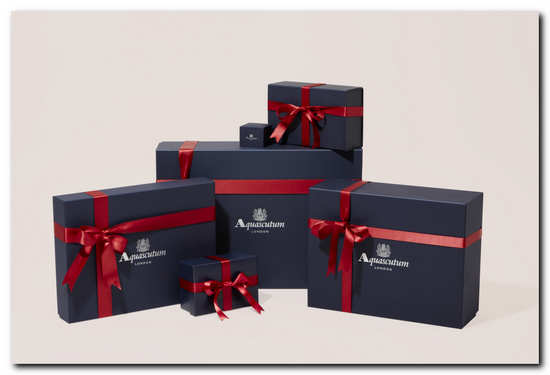
When Aquascutum noticed that their packaging solutions were too bulky for internal operations, causing supply chain inefficiencies, they engaged DS Smith to work on a new design. The packaging and supply chain specialists recognised the improvement potential, and applied their PackRight process, collaborating with Aquascutum to gather insight and develop a solution that was right for them and their supply chain.
Serena Fortuna, E-commerce Manager at Aquascutum, said: “Both from a business and consumer perspective the new packaging is fantastic. It conveys the message that we’re a luxury brand, and reflects the value and quality of our products.
“Customers have actually requested extra boxes to use as gifts because they are so pleased with them! It’s been great working with DS Smith on this project, and we hope to further our package solution with them to continue to provide our customers with the best possible service.”
DS Smith worked closely with Aquascutum from the very early stages of development, to produce a new two-piece, high quality post print pack which is suitable for use in stores or for online ordering and delivery.
The new efficient pack is smaller, solving Aquascutum’s transport and supply chain issues. It uses fewer materials, resulting in reduced costs and environmental footprint. And additionally, it features a sleek, elegant design that is consistent with customers’ expectations of the Aquascutum brand.
Tony Foster, of DS Smith’s UK Packaging Division, said: “For our customers, packaging isn’t just a means to protect content, but central to how customers perceive their brand. We were proud to deliver a product that not only upholds Aquascutum’s long heritage of quality craftsmanship, but is also built to face the realities of contemporary supply chains. Innovation is at the heart of our business and we’re always striving to deliver packaging solutions that help our customers achieve more, this includes strengthening their brand awareness.”
About DS Smith
DS Smith operates in over 36 countries and employs around 26,000 people. Using the combined expertise of our four divisions – Packaging, Recycling, Paper and Plastics – we work with customers to deliver solutions that reduce complexity and deliver results throughout the Supply Cycle. For more information, visit www.dssmith.com.
DS Smith is the UK’s leading supplier of corrugated packaging. Our comprehensive product range includes retail ready packaging, transit cases, consumer units, packs printed for gift and POS applications, and heavy duty packaging for industry. DS Smith’s national network of manufacturing plants service thousands of customers, from multinationals to local businesses.
Using PackRight®, our unique way of working, our highly-skilled people work closely with customers to specify packaging that achieves real results. Typically our customers achieve sales growth, or reductions in cost, waste and carbon at every stage of the Supply Cycle. For more information, visit www.dssmithpackaging.co.uk.
Iggesund focuses on Japan
Iggesund Paperboard is expanding in the Asia Pacific region and will open a sales office in Japan from 1 September. Over the past year Iggesund has established a service centre with sheeting and warehousing in Taiwan to cut lead times in the region.
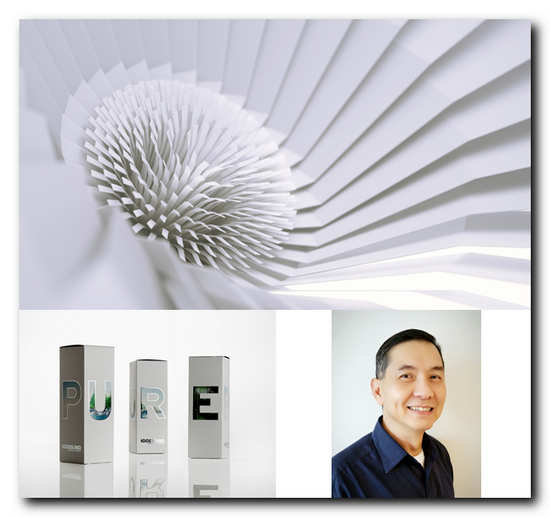
“We have great respect for Japanese business culture and are therefore only recruiting Japanese staff. We believe that this factor, together with our long-term commitment, will be decisive to succeeding in Japan,” says Ivan Chong, President of Iggesund’s Asia Pacific operations. © Iggesund
“Traditionally Iggesund has focused very much on Europe but we are now prioritising work to increase our global sales,” explains Arvid Sundblad, Vice President Sales and Marketing for Iggesund. “For more than a decade we have seen the conversion of packaging for consumer goods move from western Europe to other parts of the world, mostly in the east,” he says. “Brand owners with headquarters in one part of the world can have the manufacturing of both their goods and packaging in another. This is globalisation in a nutshell and we must adapt to it.”
The Japanese paper and paperboard market is known for its high demands on quality. Iggesund’s flagship product, Invercote, will be the cornerstone of the new venture. The paperboard is well established in the highest quality segments in the more than 100 national markets where it is sold. It is made of virgin fibre and meets exacting standards of purity, so it should do well in Japan.
“When we decided to focus more on global sales, one of the first steps was to develop our delivery service outside Europe,” explains Ivan Chong, President of Iggesund’s Asia Pacific operations. “Since then we’ve built up new inventory and sheeting facilities on the US West Coast and in Taiwan. The result is radical reductions in lead times to Asia.”
Iggesund has been represented in both Singapore and Hong Kong for almost two decades now and has been successful in building sales over that period. The improved availability means there are good prospects for the company to reach a wider market not only in Japan but also in the Asia Pacific region generally.
“The improved inventory and service are a game changer for us,” Chong says. “Now we can be competitive in contexts where before we weren’t even an option due to the lead times. We’ve already gained a number of new orders due to our new delivery capacity.”
“We have great respect for Japanese business culture and are therefore only recruiting Japanese staff,” Chong explains. “We believe that this factor, together with our long-term commitment, will be decisive to succeeding in Japan.
“Quality is extremely important in Japan,” he continues. “Hygiene, purity, and taste and odour neutrality are just some of the aspects that are emphasised more in this market than in many others. That’s why we believe Invercote has terrific opportunities to do well here.”
Invercote has long been represented by the esteemed Japanese paper merchants Takeo with a focus on the graphics market and this arrangement will continue. The new sales office will further develop new business opportunities in the premium packaging and graphical segments, where the qualities of Invercote are especially preferred.
“We believe it is a clear advantage to have two channels into this demanding market,” Arvid Sundblad concludes.
Iggesund
Iggesund Paperboard is part of the Swedish forest industry group Holmen, one of the world’s 100 most sustainable companies listed on the United Nations Global Compact Index. Iggesund’s turnover is just over €500 million and its flagship product Invercote is sold in more than 100 countries. The company has two brand families, Invercote and Incada, both positioned at the high end of their respective segments. Since 2010 Iggesund has invested more than €380 million to increase its energy efficiency and reduce the fossil emissions from its production.
Iggesund and the Holmen Group report all their fossil carbon emissions to the Carbon Disclosure Project. The environmental data form an integral part of an annual report that complies with the Global Reporting Initiative’s highest level of sustainability reporting. Iggesund was founded as an iron mill in 1685, but has been making paperboard for more than 50 years. The two mills, in northern Sweden and northern England employ 1500 people.
Stability and production platform investment
CEO Per Lindberg comments on the development during Q2 2016:
 ”After a couple of troublesome quarters we are now back on track with production running according to plans. The second quarter performance is in line with our own expectations. During the quarter it was decided to proceed with the investment in Skärblacka. The investment will enable further growth in attractive market segments and at the same time streamline the company’s production structure. The investment program will develop the Skärblacka production unit in Sweden into a world leading center for machine glazed, MG, kraft paper production, hence creating a competitive future platform for Packaging Paper to enable the selective growth strategy”
”After a couple of troublesome quarters we are now back on track with production running according to plans. The second quarter performance is in line with our own expectations. During the quarter it was decided to proceed with the investment in Skärblacka. The investment will enable further growth in attractive market segments and at the same time streamline the company’s production structure. The investment program will develop the Skärblacka production unit in Sweden into a world leading center for machine glazed, MG, kraft paper production, hence creating a competitive future platform for Packaging Paper to enable the selective growth strategy”
THE RESULT
Net sales for comparable units increased 2% compared to Q2 last year and year on year net sales show a slight increase of 1%. Adjusted EBITDA for comparable units improved with 3% compared to the first six months last year, in spite of approximately SEK 74 million higher costs for periodic maintenance shutdowns this year. Results improved in both Consumer Board and Corrugated Solutions business areas. The item affecting comparability is related to a fraud case that caused a loss of SEK 25 million in June, this is something we treat very seriously and we work diligently to try to recover the money. Our return on capital employed reached 14% which is above our target and our working capital in relation to sales improved from previous quarter from 12% to 11%. Our net debt to EBITDA ratio increased due to dividend payout to 1.32, but is significantly lower than our target of below 2.5.
MARKET OUTLOOK
Overall the market was stable and we anticipate that to continue.
For Business area Packaging Paper the brown and white sack paper markets strengthened seasonally. The pulp price was down compared to Q2 last year. The remaining segments in Packaging Paper had a stable market development with no changes to local prices.
Consumer Board delivered lower sales volumes than the first six months last year as a consequence of the problems in production in Q4 last year and the previous quarter. But as we now are back on track in production we anticipate that we will reach our growth targets during the second half of the year.
Business area Corrugated Solutions shows a continued strong performance in spite of the fact that the market did not develop as we anticipated during the quarter where liner has been stronger than expected and fluting a bit tougher than anticipated.
STRATEGY
Part of our strategy for creating long-term profitable growth is to expand our position in the value chain as well as geographically. Based on our focus and expertise in the packaging area we want both to develop and complement our sustainable materials with packaging solutions to a larger extent. It is a natural development but also necessary. In new markets, complete solutions are often required in order to introduce new materials.
During the past six months, the former subsidiary PACCESS (now Managed Packaging), with a business model fully based on packaging solutions, was fully integrated into BillerudKorsnäs. Even more recently a complete packaging system was launched together with Bosch. The latter is a unique solution for sealed packaging of dry foods based fully on renewable material. The development toward more packaging solutions is a natural evolution within each business area. In addition there is room for more revolutionary solution development in the newly formed subsidiary BillerudKorsnäs Venture AB.
BillerudKorsnäs provides packaging materials and solutions that challenge conventional packaging for a sustainable future. We are a world-leading provider of primary fibre based packaging materials and have customers in over 100 countries. The company has 8 production sites in Sweden, Finland and the UK and about 4 200 employees in over 13 countries. BillerudKorsnäs has an annual turnover of about SEK 22 billion and is listed on Nasdaq Stockholm. www.billerudkorsnas.com
The majority of U.S. consumers value paper and disagree with digital-only communications
Results of a new survey conducted by Toluna Inc. show that a majority of Americans want to retain a choice for paper options rather than be forced into “digital-only” communications.
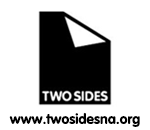 A new survey commissioned by Two Sides and conducted by Toluna Inc. reveals how U.S. consumers view corporate initiatives forcing people into digital-only communication by eliminating paper-based options. The survey also provides insight into consumer opinions on the environmental impacts of digital versus paper-based communications.
A new survey commissioned by Two Sides and conducted by Toluna Inc. reveals how U.S. consumers view corporate initiatives forcing people into digital-only communication by eliminating paper-based options. The survey also provides insight into consumer opinions on the environmental impacts of digital versus paper-based communications.
Results indicate that many consumers want to retain the choice of receiving paper bills and statements at no additional cost. For example, 79% of respondents want the option to continue receiving printed information as it provides a more permanent record, and 77% would be unhappy if they were asked to pay a premium for paper bills and statements. Other key factors in retaining paper options were ease of reading on paper compared to a screen (79% prefer paper) and unreliable internet access (49%).
Many respondents (85%) agreed that cost-saving is the main reason why companies use environmental claims such as, “Go Paperless – Go Green”, or “Go Paperless – Save trees”. In addition, 57% of respondents reported that they question the validity of such claims.
Phil Riebel, President of Two Sides North America notes, “Our results suggest that the environmental acceptance for print and paper is improving. For example, 88% of respondents agreed that when forests are responsibly managed it is environmentally acceptable to use trees to produce products such as wood for construction and paper for printing. This is good news for the graphic communications and forest products industries.” A large majority of respondents (91%) agreed that print and paper can be a sustainable way to communicate when responsibly produced and used. This is an increase of 19% when compared to results obtained in a 2013 Two Sides survey.
More education is needed to raise awareness about the industry’s positive environmental activities, in particular its commitment to sustainable forest management and recycling. Despite U.S. forests growing dramatically in volume in the past 60 years (58% growth) and 3% in area, 55% of respondents believe that U.S. forests have decreased in size. The majority of respondents also did not know that paper is one of the most recycled products in the U.S. with recovery rates of over 66%.
Compared to results obtained in 2013, almost three times more respondents reported seeing ads related to the effectiveness and sustainability of print and paper (35% in 2016 vs 12% in 2013), and the large majority rated the ads as credible and useful.
The full U.S. survey report can be downloaded at: http://www.twosidesna.org/US/The-Attractiveness-and-Sustainability-of-Print-and-Paper--The-US.-Consumers-view
Key Findings:
“Go paperless – go green” claims are questioned by many
- 85% of respondents receiving environmental claims such as, “Go Paperless – Go Green”, or “Go Paperless – Save trees” believe companies are seeking to save costs (75% of 18 to 24 year olds).
- 57% question the validity of these claims (48% of 18 to 24 year olds).
Print and paper are seen as sustainable when responsibly produced but concerns about forestry persist
- 94% agreed that recyclability is an important characteristic of environmentally responsible products (91% of 18 to 24 year olds).
- 91% agree that, when responsiby produced, used and recycled, print and paper can be a sustainable way to communicate (86% of 18 to 24 year olds).
- 88% agree that when forests are responsibly managed it is environmentally acceptable to use trees to produce products such as wood for construction and paper for printing (81% of 18 to 24 year olds).
- 86% agreed that new forest plantations are necessary to counteract global warming (80% of 18 to 24 year olds).
- 79% agreed that reading from paper is nicer than reading off a screen (79% of 18 to 24 year olds).
- 78% are concerned about the effect on forests by the production of paper (also 78% of 18 to 24 year olds).
- 76% agreed that paper is based on a renewable resource (66% of 18 to 24 year olds).
- 76% agreed that print on paper is more pleasant to handle and touch when compared to other media (73% of 18 to 24 year olds).
- 56% agree that paper records are more environmentally sustainable than electronic storage of information (45% of 18 to 24 year olds).
Many need a paper option and don’t want to be forced into a “digital only” situation
- 79% of respondents want the option to continue receiving printed information as it provides a more permanent record (75% of 18 to 24 year olds).
- 77% would be unhappy if they were asked to pay a premium for paper bills and statements (70% of 18 to 24 year olds).
- 49% of all respondents don’t have a reliable internet connection and want paper records (44% of 18 to 24 year olds).
Home printing continues
- 52% of respondents print some or most of their financial services bills and statements at home.
- 13 to 26% of respondents print between 1 and 20% of their electronic statements at home, depending on the type of statement.
- 6 to 13% of respondents print between 81 and 100% of their electronic statements at home, depending on the type of statement.
Forest growth in the U.S. is misunderstood
- 55% of respondents believe that U.S. forests have decreased in area (62% of 18 to 24 year olds)
- 19% believe they have stayed the same.
- 11% believe they have increased in area (8% of 18 to 24 year olds).
U.S. forests have increased by 58% in wood volume and 3% in area over the past 60 years (USDA Forest Service, 2012).
The great recycling story of print and paper is not well known
- 70% of respondents believe that less than 50% of waste paper is recovered for recycling (80% for 18 to 24 year olds).
- 9% believe it is over 60% (4% for 18 to 24 year olds).
- 8% of respondents correctly answered that paper products have the highest recycling rate in the U.S. when compared to other materials such as glass, plastic and metals (5% of 18 to 24 year olds).
The current recovery rate for paper products in the U.S. is 66.8% (American Forest & Paper Association, 2016).
More people are seeing ads promoting print and paper
Over 35% of respondents indicated that they have seen ads promoting the effectiveness or environmental friendliness of print and paper. This is almost 3 times more respondents than in our 2013 survey (12%), and the large majority rated the ads as credible and useful.
About Two Sides
Two Sides is an independent, nonprofit organization created to promote the responsible production, use and sustainability of print and paper. Two Sides is active globally in North America, Europe, Australia, South Africa, Brazil and Colombia. Our members span the entire print and paper value chain, including forestry, pulp, paper, inks and chemicals, pre-press, press, finishing, publishing, printing, envelopes and postal operators.
Kotkamills’ new consumer board machine now in production
Kotkamills’ new consumer board machine, BM2, has started production in Kotka, Finland. A range of folding boxboards will be produced under the brand name AEGLE and a range of food service boards under the brand name ISLA.
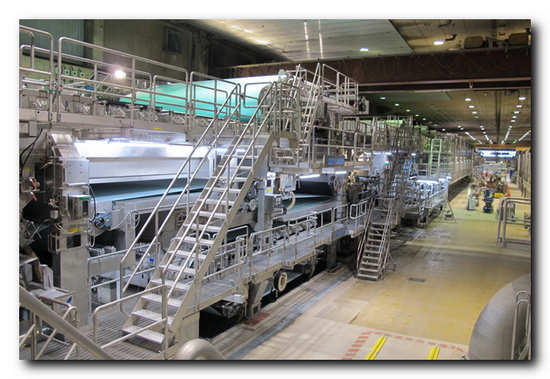
BM2 is the first machine in the world to have the capability to produce dispersion barrier coatings directly on the machine, producing barrier boards that can be recycled with normal paper waste due to having zero plastic content.
“The interest in our new sustainable products has been massive. The new machine offers a wide range of interesting possibilities for converters, brand owners and designers alike. Another of the machine’s unique features is the ability to produce board with a silk matte surface, providing brand owners the possibility to make their product really stand out,” says Markku Hämäläinen, CEO of Kotkamills.
The Consumer Boards business will serve two main market areas. The first is the market for the production of packaging for food, confectionery, pharmaceuticals and cosmetics. The second is the market for food service boards for disposable cups and plates. All products are based on Nordic fresh forest fibres and come with the unique possibility of the addition of on-machine dispersion coated barriers to replace the non-renewable plastics traditionally used.
The new machine will provide an increase to the environmental performance of the site by significantly decreasing the consumption of electricity and water compared to the former paper production process. The consumption of water per tonne of CTMP will be almost halved compared to earlier.
Kotkamills’ Consumer Board machine BM2 in short
- Production capacity 400,000 t/a
- Primary products: high-quality Nordic folding boxboard and recyclable barrier board for the packaging industry and food service sector
- Total investment 170 MEUR
- More than 5 MEUR has been invested in the effluent treatment plant, improving the cleanliness of the waste water
- Main machinery suppliers: Bellmer Vaahto Paper Machinery Oy (from the wet end to drying section of the machine) and Valmet (online coating section, reeler, winder and CTMP plant)
Further information:
Markku Hämäläinen, CEO of Kotkamills Oy
tel. +358 40 721 0548
This email address is being protected from spambots. You need JavaScript enabled to view it.
About Kotkamills
Kotkamills is a responsible partner that delivers renewable products and performance to its customers’ processes via product innovations created from wood, a renewable raw material. Our key brands include Absorbex® and Imprex®, both innovative laminating paper products for the laminate, plywood and construction industries. Moreover, Kotkamills offers ecological, technically sound and visually attractive wood products for demanding joinery and construction. In summer 2016, Kotkamills will start-up a new cartonboard machine designed to produce folding boxboard and food service boards for consumer markets, including the capability to add barriers on-machine. All Consumer Boards material solutions will be fully recyclable and repulpable.
Kotkamills has two production sites in Finland, located in Kotka and Imatra, and a subsidiary L.P. Pacific Films for Imprex® production in Malaysia. The majority shareholder of Kotkamills is MB Funds, a Finnish private equity firm.
www.kotkamills.com

